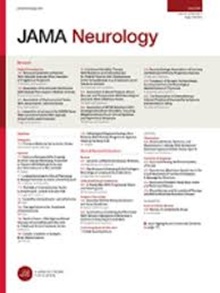Cardioprotective Glucose-Lowering Agents and Dementia Risk
IF 20.4
1区 医学
Q1 CLINICAL NEUROLOGY
引用次数: 0
Abstract
ImportanceAlthough diabetes is a risk factor for dementia, the effect of glucose-lowering therapy for prevention of incident dementia is uncertain.ObjectiveTo determine whether cardioprotective glucose-lowering therapy (sodium-glucose cotransporter-2 inhibitors [SGLT2is], glucagon-like peptide-1 receptor agonists [GLP-1RAs], metformin, and pioglitazone), compared with controls, was associated with a reduction in risk of dementia or cognitive impairment, and among primary dementia subtypes.Data SourcesThe PubMed and Embase databases were searched for studies published from inception of the database to July 11, 2024.Study SelectionRandomized clinical trials comparing cardioprotective glucose-lowering therapy with controls that reported dementia or change in cognitive scores. Cardioprotective glucose-lowering therapies were defined as drug classes recommended by guidelines for reduction of cardiovascular events, based on evidence from phase III randomized clinical trials. Inclusion criteria were assessed independently and inconsistencies were resolved by consensus.Data Extraction and SynthesisData were screened and extracted independently by 2 authors adhering to the PRISMA guidelines in August 2024. Random-effects meta-analysis models were used to estimate a pooled treatment effect.Main Outcomes and MeasuresThe primary outcome measure was dementia or cognitive impairment. The secondary outcomes were primary dementia subtypes, including vascular and Alzheimer dementia, and change in cognitive scores.ResultsTwenty-six randomized clinical trials were eligible for inclusion (N = 164 531 participants), of which 23 trials (n = 160 191 participants) reported the incidence of dementia or cognitive impairment, including 12 trials evaluating SGLT2is, 10 trials evaluating GLP-1RAs, and 1 trial evaluating pioglitazone (no trials of metformin were identified). The mean (SD) age of trial participants was 64.4 (3.5) years and 57 470 (34.9%) were women. Overall, cardioprotective glucose-lowering therapy was not significantly associated with a reduction in cognitive impairment or dementia (odds ratio [OR], 0.83 [95% CI, 0.60-1.14]). Among drug classes, GLP-1RAs were associated with a statistically significant reduction in dementia (OR, 0.55 [95% CI, 0.35-0.86]), but not SGLT2is (OR, 1.20 [95% CI, 0.67-2.17];心脏保护降糖剂与痴呆风险
虽然糖尿病是痴呆的危险因素,但降糖治疗对预防痴呆的作用尚不确定。目的确定与对照组相比,心脏保护降糖治疗(钠-葡萄糖共转运体-2抑制剂[SGLT2is]、胰高血糖素样肽-1受体激动剂[GLP-1RAs]、二甲双胍和吡格列酮)是否与痴呆或认知障碍风险降低以及原发性痴呆亚型相关。数据来源检索PubMed和Embase数据库,检索从数据库建立到2024年7月11日发表的研究。研究选择:比较心脏保护降糖治疗与报告痴呆或认知评分改变的对照组的随机临床试验。根据III期随机临床试验的证据,保护心脏的降糖治疗被定义为指南推荐的减少心血管事件的药物类别。纳入标准独立评估,不一致通过共识解决。数据提取和合成数据由2位作者在2024年8月按照PRISMA指南独立筛选和提取。随机效应荟萃分析模型用于估计合并治疗效果。主要结局和测量主要结局测量是痴呆或认知障碍。次要结果是原发性痴呆亚型,包括血管性痴呆和阿尔茨海默氏痴呆,以及认知评分的变化。结果26项随机临床试验(N = 164 531名受试者)符合纳入条件,其中23项试验(N = 160 191名受试者)报告了痴呆或认知障碍的发生率,其中12项试验评估SGLT2is, 10项试验评估GLP-1RAs, 1项试验评估吡格列酮(未发现二甲双胍试验)。试验参与者的平均(SD)年龄为64.4(3.5)岁,女性为57470(34.9%)。总体而言,心脏保护降糖治疗与认知障碍或痴呆的减少没有显著相关(优势比[or], 0.83 [95% CI, 0.60-1.14])。在药物类别中,GLP-1RAs与痴呆的减少有统计学意义(OR, 0.55 [95% CI, 0.35-0.86]),但与SGLT2is无关(OR, 1.20 [95% CI, 0.67-2.17];异质性的P值= .04)。结论和相关性虽然心脏保护降糖治疗与全因痴呆的总体减少无关,但这项随机临床试验的荟萃分析发现,GLP-1RAs降糖与全因痴呆的统计学显著减少相关。
本文章由计算机程序翻译,如有差异,请以英文原文为准。
求助全文
约1分钟内获得全文
求助全文
来源期刊

JAMA neurology
CLINICAL NEUROLOGY-
CiteScore
41.90
自引率
1.70%
发文量
250
期刊介绍:
JAMA Neurology is an international peer-reviewed journal for physicians caring for people with neurologic disorders and those interested in the structure and function of the normal and diseased nervous system. The Archives of Neurology & Psychiatry began publication in 1919 and, in 1959, became 2 separate journals: Archives of Neurology and Archives of General Psychiatry. In 2013, their names changed to JAMA Neurology and JAMA Psychiatry, respectively. JAMA Neurology is a member of the JAMA Network, a consortium of peer-reviewed, general medical and specialty publications.
 求助内容:
求助内容: 应助结果提醒方式:
应助结果提醒方式:


